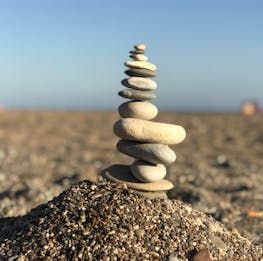In the words of Forest Gump, 'Life is like a box of chocolates, you never know what you're going to get.' While there's some element of excitement in the unknown and being able to choose from a myriad of possibilities, Barry Schwartz explains that options and choices have got entirely out of control. The anxiety of our age can largely be attributed to how many choices we're offered, under the guise of freedom. This so-called freedom, has trapped us in an illusion of infinite possibilities, and this limitless possibility is what's causing us so much stress and anxiety.
The Paradox of Choice provides tips on taking control of choices. It highlights making good choices about the things that matter, and ignoring things that don't matter. By drawing on research from psychologists, economists, market researchers, and scientists, decision-making and the flaws in conventional wisdom are explored.
Barry Schwartz is an American psychologist and professor, who's written extensively on social theory and behavioral science. In The Paradox of Choice, he delves into decision-making, and how we're skirting a fine line between autonomy and freedom, and being utterly overwhelmed.
Schwartz argues that 'When people have no choice, life is almost unbearable,' but growing consumer culture and more variety has had a powerful and positive effect. However, there's a limit, and he further argues that 'as the number of choices keeps growing, negative aspects of having a multitude of options begin to appear.' What's more, 'as the number of choices grows further, the negatives escalate until we become overloaded. At this point, choice no longer liberates, but debilitates. It might even be said to tyrannize.'
We'll briefly begin by scaffolding the vast arena of daily decisions that we're faced with. There's no doubt that choice improves the quality of life, and is essential to autonomy. However, we need to direct our own lives and realize that while some choice is good, this doesn't mean that more choice is necessarily better. Schwartz argues that too many options cause anxiety and depression, because choice can inhibit freedom. Choice also saps our free time and energy.
It’s a Jungle out There
You've heard of the phrases menu envy, buyers remorse, and FOMO? Well, these are all postmodern side effects of making, or fearing making the wrong choices.
Whether we're shopping for jeans, or merely trying to order a simple coffee, it seems that nothing is in fact simple. If we start with our basic human need for food, a grocery store visit reveals that there's nothing basic about food anymore. Buying a bag of potato chips, cereal, crackers, cookies, even vegetables, has become incredibly complex. There's a choice at every turn. Do you want bite-sized, large, family-sized, gluten-free, sodium-free, organic, grain-fed, imported, artisanal, fair-trade, ethically-sourced, farm-fresh, sugar-free, pay by debit card, cash, or credit card? And do you want a bag with that?
Did you know that the average American supermarket, stocks about 30 thousand items?
What we choose to include in our shopping carts is mostly a trivial choice. However, trivial decisions need to be recognized and identified. This is because, while our lives won't be irrevocably changed by a poor choice in aisle seven, the amount of time and energy that we spend grocery shopping, should be questioned. Furthermore, if you're prone to "shopping around," or "comparison shopping," in order to get the best price available, you'll know how many hours this adds to shopping time. To counteract this, Schwartz recommends throwing out the idea of searching for the "best," and realizing that sometimes it's okay to make do with, "that'll do."
When it comes to choice, the stakes dramatically increase when purchasing durable goods such as appliances, electronics, and technology. If we make a mistake purchasing one of these items, there's a lot more economic impact. Hence these purchases are a lot more psychologically taxing. Choices after all, have consequences.
Furthermore, shopping now includes knowledge, health, and all aspects of our future. A typical university prospectus is more of a shopping catalog. The number of courses on offer has escalated to "cater to everyone." Students can "shop around" for classes, and sample lectures to determine if it's worth signing up for. Nowadays, there are more courses than ever, and more options to tailor the "right fit" for you.
But what if it's not the right fit? What if you choose the wrong course and go in the wrong direction? Purchasing bundles of knowledge, and customizing your own degree, means that you only have yourself to blame if it's not the right choice. This puts a tremendous amount of pressure on young people. There's also no shared educational experience when everyone is signed up to do a series of different courses, rather than a shared degree, which affects the overall collegial atmosphere.
It's no wonder that choice has become such a massive part of life. Did you know that Americans have more shopping centers than high schools? And although people spend more time shopping than they used to, they enjoy it less. So why is it that with more choice comes less gratification?
Making the "Right" Choice
We started out with limited choices. However, as we've developed and advanced, our options have increased exponentially. Making well-informed choices is becoming more difficult because there are so many choices and increased competition. Changing to another option can be daunting, so we stick to what we know, even when more affordable options are available.
How do you make the "right" choice when it comes to medical care or insurance?
Unless you're an expert in these areas, how can you possibly make the best choice, or even an okay choice?
Up until recently, in the US, there was one type of health insurance. This shift has meant that typically employers offer their employees a range of health insurance and retirement options. The options are literally endless, and although many of us benefit from this new array of choices, there's little doubt that making decisions around healthcare and insurance, is incredibly taxing. Furthermore, by providing us with the choices, employers seem to be washing their hands of any further assistance regarding health insurance and pension fund advice. It's almost as if they're saying, 'we've given you so many options to choose between, we've done our job.'
A mistake regarding any insurance for the future, can have devastating effects. In some cases, poor past decisions have resulted in seniors having to choose between medicine and food.
The medical industry has also adapted to the growing trend of providing seemingly infinite options. Nowadays, it's often left up to the patient to guide the doctor on how they'd like to be treated. Responsibility for medical care has become the patient's responsibility, and we can now make decisions about treatment plans and medication. As patients, we used to do what we were told, and doctors often withheld information. Now we're at the other extreme where patients have to make decisions that we're not equipped to make, and once again, the shift in responsibility has gone too far.
With life and death decisions, we often want others to choose for us. Living with the ramifications of making the wrong decision about medical treatment, isn't something the average individual is equipped to deal with. Doctors are trained to make decisions for patients. And, while we're more informed because of the internet, and access to more medical information, we're not qualified medical practitioners. Furthermore, we're inundated with alternative treatments and advertising, which has added even more pressure. Prescription drugs are advertised to us, even though we can only purchase them with a medical script. These advertising messages show how much agency we have, when influencing doctors about what medication we require. Ultimately doctors are becoming mediators between us, and our decisions.
It doesn't stop there. We're also given an abundance of choices about how to look, how to work, how to have a relationship, what belief system to choose, and how to define our identities. Human existence depends on the choices that we make. Unconscious decisions don't impact our psyches because they're part of our routines and our habits. However, when it comes to conscious decisions, this is where things get tricky.
Too Many Options
Have you ever opened a food menu and been faced with pages and pages of options? And how often when this happens, do you just close the menu, and opt for a familiar favorite like a grilled cheese sandwich?
Social scientists argue that because we're rational, options can only make us better off. They posit that we can either go with the options, or ignore them. However, empirical studies suggest otherwise. Numerous studies around choice, reveal that too much of it can be highly demotivating.
Let's look at a study held in an upscale community, where people were offered a selection of jams to taste. At the tasting table, the tasters were offered a choice of jams and told that they would get $1 off if they bought a jar. One group was offered six jams for tasting, while the other was offered the full range of 24 jams. In both cases, all 24 jams were on sale, and displayed accordingly.
The table with the more extensive jam selection, brought more tasters to the display. However, both groups tasted the same number of jams on average. And when it came to purchasing the jam, 30% of people exposed to the smaller selection of tasting options bought a jar of jam, whereas only 3% of those exposed to the full selection purchased a jar. The major finding from this group of studies is that people are overwhelmed when they're offered too much choice, so they simply decide not to decide.
A range of choices creates new problems. And whether we're making complex or trivial decisions, we tend to spend vast amounts of time and energy making choices, while simultaneously experiencing anxiety, and even dread.
So, why can't we just ignore the options when we're bombarded by too many of them?
Firstly, advertisers make products impossible to ignore. It seems as if we're repeatedly assaulted with more choices, and more stuff to buy. Secondly, we feed off what others do, and compare ourselves to them. You've heard the saying, "keeping up with the Joneses?" This stemmed from the rise of consumerism, and the idea that you need to have what those around you have, in order to be happy. Thirdly, there's what Fred Hirsch referred to as 'the tyranny of small decisions.' The tyranny of small decisions is when you get caught in the loop of just going to one more shop, or looking at one more website. By saying "just one more," you minimize the task, so it doesn't seem like a big deal. Lastly, we've been led to believe that the more options we have, the better this is, because there should be "something for everyone."
The Cost of Choice
We've gone through a fraction of the choices we're asked to make in our daily lives, and when looking at cumulative choices, this is where things pile up. Unfortunately, poor decisions don't just have an economic impact; there are also psychological effects that can cause suffering.
Schwartz draws on psychological studies to show how we're affected by decision-making. We've already seen how freedom of choice can lead to feeling overwhelmed, and how we're sold the idea that we can change our minds if something isn't to our satisfaction.
One of the key insights is that happiness doesn't correlate with more options. On the contrary, an abundance of options often leads to increased depression and isolation. Furthermore, the more wealth and possessions we accumulate, the more we focus on ourselves, and the less we focus on others. Much of our social fabric's collapse is because we seek happiness and validation from objects, rather than other people. This is exacerbated by growing consumer culture and an abundance of options for so-called happiness.
In America over the last 30 years, happiness has taken a significant dip. Furthermore, according to some estimates, rates of clinical depression have gone up by ten times since the 1900s.
You may have experienced FOMO before. This fear occurs because we veer towards focussing on what we're missing out on, rather than what we have in front of us. We view all those things that we don't choose as missed opportunities. This is known as opportunity cost. Opportunity cost is when decisions are seen as trade-offs, as opposed to things packed with potential. Hence, we're frequently unsatisfied with our choices, because we gauge them in relation to what we're missing out on.
We also judge our decisions based on past experiences. As the saying goes, 'you either have a good time, or a good story.' When we look back on past experiences, we often look back on the negative experiences, which colors how we make future decisions. For example, you may have had a brilliant vacation with your partner, but on the last day ended up having a big fight. The memory of the fight is likely to influence your decision to travel to that destination again.
The economist Robert Hirschman argues that we're now offered the choice to opt-out of anything that we don't like. We don't have to commit to anything anymore, which leads to more anxiety. When we're told we have to commit to something, we accept our fate, and learn to deal with consequences.
Choose What you Choose to Choose
How do we make the "right" choices, and how do we get better at effective choice-making?
It's easy to make some choices because rules govern them. As much as we often find rules stifling, they enable us to relinquish control and just go with the flow. So it might be a good idea to set rules and boundaries for yourself to limit the number of choices you have to make.
Good decisions involve a series of steps. The first step is to examine your goals, and then analyze these goals in terms of the order of importance. Once you've done this, consider all of the options, and ascertain how they account for each goal. Now you'll be able to pick the winning option. Reflecting on the decisions you make, is vital in determining consequences, and guiding you in making future decisions.
There's a lot of pressure in making decisions, but it's worth remembering that we're incredibly adaptable. Studies show that we don't derive as much pleasure from material things as we think we do. For example, studies show that lottery winners' happiness levels decrease relatively quickly after their initial euphoria. So while we think that buying a fantastic television will result in an endless supply of happiness, this simply isn't the case.
We think that it's essential to be the best and make the best decisions all the time, but this doesn't result in higher levels of happiness. On the contrary, seeking out the best all the time has detrimental effects on our well-being. So it might be worth taking the pressure off of ourselves by realizing that we don't have to make the best decisions all the time, and that sometimes being satisfied is good enough. People who opt for satisfaction, end up happier and less anxious in the long run.
In Conclusion
The Paradox of Choice illustrates that, we would be better off if we voluntarily opted out of some decisions. Furthermore, sometimes constraints, fewer options, and abiding by rules, are good because they force us to focus on what's important, and what will get us closer to our goals.
Schwartz argues that we need to adjust our mindset when it comes to making some choices. For example, it's okay to opt for "good enough" instead of trying to be "the best" all the time. The search for perfection is a massive time-waster, and unnecessary in many instances where we need to make decisions quickly. We're sold the idea that we need to have high standards, but to be happier and more fulfilled, we need to lower our expectations.
The truth is that not all decisions are life-changing, and there's a lot of hyperbole and noise around good choices. All this does is add to the mounting pressure, and also makes us second-guess ourselves. We need to learn to stick to our decisions, and to put these decisions in a metaphorical box. Occasionally we can open the box and evaluate the choices that we've made, but having the option to change our minds often leads to overthinking and spiraling.
Finally, we have to take responsibility for our choices, but that doesn't mean blaming ourselves too much. Yes, we have to take ownership, but we also have to realize that we're adaptable and can cope with poor decisions.
So, isn't it about time that your choices started working for you, instead of you working so hard for your choices?




